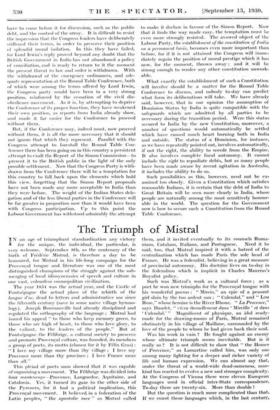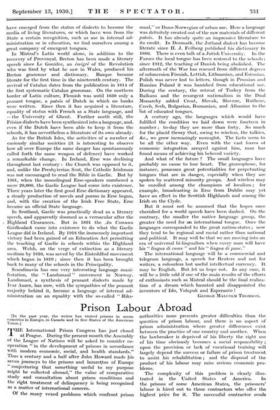The Triump h of Mistral
N an age of triumphant standardization any victory 1 for the unique, the individual, the particular, is very Welcome. SePtember 8th, as the centenary of the birth of Frederic Mistral, is therefore a day to be honoured, for Mistral in hiS life-long campaign for the Provencal tongue and literature was one of the most distinguished champions of the struggle against the sub- merging oflocal idiosyncrasies of speech and culture in one vast, colourless cosmopolitan civilization.
The year 1854 was the actual year, and the Castle of Fontsegugne the actual place of the rebirth of the longue d'oc, dead to letters and administrative use since the fifteenth century (save in some naive village hymno- logy). Joseph Roumanville had already disciplined and regulated the orthography of the language ; Mistral had issued his appeal " to those who keep memory green, to those who are high of heart, to those who love glory, to the valiant, to the leaders of the people." But at Fontsegugne, the Felibrige, a cultural society to preserve and promote Provencal culture, was founded, its members a group of poets, its motto (chosen for it by Felix Gras) : " I love my village more than thy village ; I love my ProVence more than thy province ; I love France more
than all." •
This pleiad of poets soon showed that it was capable of organizing a movement. The Felibrige was divided into four mantenenco—Provence, Languedoc, Aquitaine, and Catalonia. Yes, it turned its gaze to the other side of the Pyrenees, for it had a political implication, this Provencal movement. It believed. in 4 federation of the Latin peoples, " the apostolic race " as Mistral called
them, and it invited eventually to its counsels Ruma- nians, Catalans, Italians, and Portuguese. Need it be said, too, that Mistral inspired it with a hatred of the centralization which has made Paris the sole head of France. He was a federalist, believing in a great measure of provincial autonomy. His doctrine lives on to-day in the federalism which is implicit in Charles Maurras's Royalist policy.
Such was Mistral's work as a cultural force ; as a poet he won new triuMphs for the Provencal tongue with his wonderful poems " Mireio," an epic of a peasant girl slain by the too ardent sun ; " Calendab" and " Lou Rose," whose heroine is the River Rhone. " La Provence," says Daudet, "Hera eternellement dans Mireille ' et dans Calendal.' " Magnificent of physique, an idol ready- made for the drawing-rooms of Paris, Mistral remained obstinately in his village of Maillane, surrounded by the love of the people to whom he had given back their soul.
Was his work in vain ? He fought against an enemy whose ultimate triumph seems inevitable. But is it really so ? It is not difficult to show that " the HoMer of Provence," as Lamartine called him, was only one among many fighting for a deeper and richer variety of life and human expression. -We can almost say that, under the threat of a world-wide dead-sameness, man- kind has reacted to evolve a new and stronger complexity. At the Congress of Vienna there were eleven European languages used in official inter-State correspondence. To-day there are twenty-six. More than double ! • But the question is much more complicated than that, If we count those-languages which, in the last century,
have emerged from the status of dialects to become the media of living literatures, or which have won from the State a certain recognition, such as use in internal ad- ministration or in education, we find ourselves among a great company of emergent tongues.
In Mistral's Latin world alone, in addition to the recovery of Provencal, Breton has been made a literary speech since Le Gonidec, an émigré of the Revolutidn who Was fired by what he saw in Wales, produced his Breton grammar and dictionary. Basque became literate for the first time in the nineteenth century. The revival of Catalan dates from the publication in 1814 of the first systematic Catalan grammar. On the northern border of Latin culture, Flemish was until 1830 only a peasant tongue, a patois of Dutch in which no books were written. Since then it has acquired a literature, equality of status with French as a State language, and —the University of Ghent. Further north still, the Frisian dialects have been synthesized into a language, and, even if the Dutch have been able to keep it from the schools, it has nevertheless a literature of its own already.
As for the British Isles, the activities of a number of curiously similar societies (it is interesting to observe how all over Europe the same danger has spontaneously called forth the same weapon of defence) have worked a remarkable change. In Ireland, Erse was declining throughout last century : the Church was opposed to it, and, unlike the Presbyterian Scot, the Catholic Irishman was not encouraged to read the Bible in Gaelic. But by 1901, when the monolingual Erse-speakers numbered a mere 20,000, the Gaelic League had come into existence. Three years later the, first good Erse dictionary appeared, a steady production of novels and poems in Erse began, and, with the creation of the Irish Free State, Erse became an official State language.
In Scotland, Gaelic was practically dead as a literary speech, and apparently doomed as a vernacular after the Highland Clearances. But in. 1891 the An Comunn Gaidhealach came into existence to do what the Gaelic League did in Ireland. By 1918 the immensely important victory had been gained of an Education Act permitting the teaching of Gaelic in schools within the Highland area. Welsh, on the verge of extinction as a literary medium by 1810, was saved by the Eisteddfod movement which began in 1819 ; since then it has been brought back to many of the schools in the Principality.
Scandinavia has one very interesting language mani- festation, the " Landsmaal " movement in Norway. Landsmael, a synthesis of peasant dialects made by Ivar Aasen, has now, with the sympathies of the peasant majority behind it, become a language of internal ad- ministration on an equality with the so-called " Riks-
meal," or Dano-Norwegian of urban use. Here a language was definitely created out of the raw materials of different patois. It has already quite an impressive literature to its credit. In Denmark, the Jutland dialect has become literate since H. J. Feilberg published his dictionary in 1886. There is even talk of a Jutish University. In the Fames the local tongue has been restored to the schools ; since 1912, the teaching of Danish being abolished. The aftermath of the War has rescued from different degrees of submersion Finnish, Lettish, Lithuanian, and Estonian. Polish was never lost to letters, though in Prussian and Russian Poland it was banished from educational use. During the century, the retreat of Turkey from the Balkans and the resurgent nationalism in the Dual Monarchy added Croat, Slovak, Slovene, Ruthene, Czech, Serb, Bulgarian, Rumanian, and Albanian to the list of educated tongues.
A century ago, the languages which would have fulfilled the condition we laid down were fourteen in number ; to-day they are more than forty. So much for the placid theory that, owing to wireless, the talkies, &c., we grow increasingly monoglot. The facts seem to be all the other way. Even with the vast forces of economic integration arrayed against him, man has found means of achieving his beloved variety.
And what of the future ? The small languages have probably no cause to lose heart. The gramophone, for instance, possesses great potentialities for perpetuating tongues that are in danger, especially when they arc spoken by scattered minority groups. • And wireless may be enrolled among the champions of localism ; for example, broadcasting in Erse from Dublin may yet have an effect in the Scottish Highlands and among the Irish on the Clyde.
But it must not be assumed that the hopes once cherished for a world speech have been dashed. On the contrary, the smaller the native language group, the greater the need for an international tongue. Once the languages corresponded to the great nation-states ; now they tend to be regional and racial rather than national and political. It may well be that we are moving into an era of universal bi-lingualism when every man will have his " lingua di cuore " and his " lingua di pane."
The international language will be a commercial and telegram language, a speech for Reuters and not for writers, a colourless but useful intellectual currency. It may be English. But ,let us hope not. In any case, it will be a little odd if one of the main results of the efforts of enthusiasts such as Mistral should be the final realiza- tion of a dream which haunted and disappointed the inventors of Ido, Volapuk and Esperanto 1
GEORGE MALCOLM THOMSON.











































 Previous page
Previous page